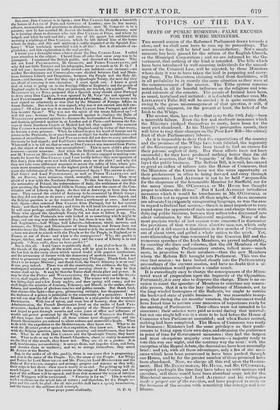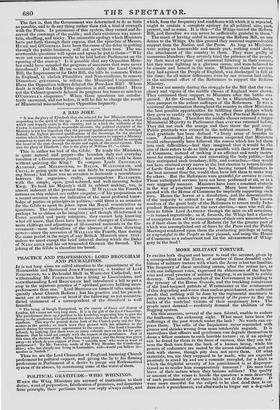TOPICS OF THE DAY.
STATE OF PUBLIC BUSINESS ; FALSE EXCUSES FOR THE WHIG MINISTERS.
THE second session of the Reformed Parliament draws towards a close, and we shall soon have to sum up its proceedings. The
account, we fear, will be brief and unsatisfactory. Not a single measure has been passed for the reform of the English Church, or the Municipal Corporations; and we are informed by the Go- vernment, that nothing of the kind is intended. The bills which have been introduced by well-meaning individuals for the amend- ment of the Criminal Law, will be rejected, by those Ministers whose duty it was to have taken the lead in preparing and carry- ing them. The Dissenters, claiming relief from disabilities, will in all probability be in exactly the same situation as they were at the commencement of the session. The Tithe system remains untouched, in all its baneful influence on the religious and tem- poral interests of the country. The people of Ireland have been,
as usual, tantalized and irritated : it is doubtful whether even Mr. LITTLETON'S Tithe Bill will be carried ; it is quito certain ,that, owing to the gross mismanagement of that question, it will, if carried, only augment, for the present at least, the hatred of the Irish to the Whigs. The session, then, has so far—that is up to the 19th July—been a miserable failure. Even Elia few and moderate measures which
the Ministers pledged themselves to carry, have been fur the most part abandoned. In his Majesty's prorogation speech, they will have to ring their changes on the Poor-Law Bill—the solitary fruit of their Parliamentary labours. As it is impossible to deny that the expectations of the country and the promises of the Whigs have been falsified, the ingenuity of the Government papers has been taxed to find an excuse for their patrons' neglect of duty. But these efforts have not been successful ; for they have produced nothing better than the old
exploded assertion, that the " loquacity " of the Radicals has de- layed the public business. The Reform Bill, it is said, has caused so great an influx of talkers into the House of Commons, that
the Ministers of the Crown have not the same opportunity as
their predecessors in office to bring forward and carry through their measures : Lord ALTHORP is not to be held " responsible for the eloquence of the honourable Member for Sheffield, nor for the many times Mr. O'CONNELL or Mr. HUNIE has thought proper to address the House." But if Lord ALTHORP introduces measures which it would be treacherous in Mr. OCONNELL or Mr. HUIRE not to oppose with all their might,—if those measures are advocated in.extiemely exasperating language, as was the case in regard to Ireland 'last session,—then it is most impudent to turn round upon the opponents of such measures and charge theta with delay ing public business, because they refuse tob e dragooned into silent submission by the Ministerial majorities. Many of the most precious weeks of last session were consumed in discussing the provisions of that worse than abortive measure, which only caused (if it did cause) a diminution in five months of 79 offences out of about 8000, and galled a whole nation to the quick. Yet, notwithstanding the time consumed by the Coercion Bill and the numerous speeches of the Irish Members, we proved indisputably, by counting the lines and columns, that the old Members of the House, the regular Parliamentary orators, talked more—much more, in proportion to their numbers—than the new Members whom the Reform Bill brought into Parliament. This was the case last session : we have looked closely into the Parliamentary proceedings of the current session, and have no doubt that a si- milar calculation would produce a similar result.
It is exceedingly easy to charge the consequences of the Minis- terial want of preparation upon the loquacity of the Opposition. Fortunately, it is easy also to disprove the charge. There is no oc- casion to count the speeches of Members to convince any reason- able person, that it is to the lazy inefficiency of Ministers, not to the long-winded harangues of the Radicals, we ought to ascribe the backward state of public business. It was reasonable to sup- pose, that during the six months' vacation, the Government would have found time to mature some measures of importance ready for the meeting of Parliament. Their offices were not intended to be sinecures; their salaries were paid as usual during that interval; but not one single bill was in a state to be laid before the House of Commons when Parliament assembled; and when Easter arrived, nothing had been completed. The House of Commons was ready for business: Ministers had the same privileges as their prede- cessors in fixing upon their own days, and obtaining the preference in point of time for Government measures : they had the largest and most obsequious majority ever known—a majority ready to vote this way one night, and the contrary way the next : with the exception of the Repeal debate, the discussions have been unusually brief: and yet, with all these advantages, only a few of the mea- sures which have been persevered in have been pushed through one House, and by far the greater number of those promised have been abandoned. Now, we charge all this evil upon the Govern- ment. Had Mr.BucniNGRAst, Mr. Hums:, and Mr. O'CONNELL, occupied quadruple the time they have taken up with motions and speeches, still there would have been abundant scope left for the Ministerial measures,—had Lord ALTHORP and his colleagues made a proper use of the vacation, and been prepared to carry on the business of the session with something like courage and con- fidence. The fact is, that the Government was determined to do as little as possible, and to do any thing rather than risk a trial of strength with the Peers. In pursuance of this system, they earned and de- served the contempt of the public; and their existence was uncer- tain, shuffling, and tricky. The miserable apology which Ministers have put forth through their organs, that the speeches of Messrs. HUME and O'CONNELL have been the cause of the delay in getting through the public business, will not serve their turn. The un- answerable questions will again and again be put to them—" Why were not your measures ready to be laid before Parliament on the opening of the session ? Is it possible that any Opposition Mem- ber could have retarded the progress of measures that were never introduced? Did Mr. Hums vexatiously delay the Local Courts Bill, the Imprisonment for Debt Bill, the bills to commute Tithes in England, to abolish Pluralities and Non-residence, to remove Dissenters' grievances, to reform the Municipal Corporations? Have the Opposition talkers delayed the Poor-Law Bill ? Whose fault is it that the Irish Tithe question is still unsettled? Have not the Cabinet quarrels delayed its progress ten times as much as O'CoissrELL's eloquence." When these questions are satisfac- torily answered, and not before, it will be fair to charge the result of Ministerial misconduct upon Opposition loquacity.



















 Previous page
Previous page